Title search results
Showing 1 - 8 of 8 items
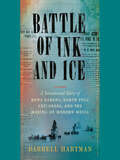
"Absolutely gripping… a perfectly splendid read—I highly, highly recommend it" — Douglas Preston, author of the #1 New York Times…
bestseller The Lost City of the Monkey God A sixty-year saga of frostbite and fake news that follows the no-holds-barred battle between two legendary explorers to reach the North Pole, and the newspapers which stopped at nothing to get–and sell–the story. In the fall of 1909, a pair of bitter contests captured the world’s attention. The American explorers Robert Peary and Frederick Cook both claimed to have discovered the North Pole, sparking a vicious feud that was unprecedented in international scientific and geographic circles. At the same time, the rivalry between two powerful New York City newspapers—the storied Herald and the ascendant Times —fanned the flames of the so-called polar controversy, as each paper financially and reputationally committed itself to an opposing explorer and fought desperately to defend him. The Herald was owned and edited by James Gordon Bennett, Jr., an eccentric playboy whose nose for news was matched only by his appetite for debauchery and champagne. The Times was published by Adolph Ochs, son of Jewish immigrants, who’d improbably rescued the paper from extinction and turned it into an emerging powerhouse. The battle between Cook and Peary would have enormous consequences for both newspapers, and help to determine the future of corporate media. BATTLE OF INK AND ICE presents a frank portrayal of Arctic explorers, brave men who both inspired and deceived the public. It also sketches a vivid portrait of the newspapers that funded, promoted, narrated, and often distorted their exploits. It recounts a sixty-year saga of frostbite and fake news, one that culminates with an unjustly overlooked chapter in the origin story of the modern New York Times. By turns tragic and absurd, BATTLE OF INK AND ICE brims with contemporary relevance, touching as it does on themes of class, celebrity, the ever-quickening news cycle, and the benefits and pitfalls of an increasingly interconnected world. Above all, perhaps, its cast of characters testifies—colorfully and compellingly—to the ongoing role of personality and publicity in American cultural life as the Gilded Age gave way to the twentieth century—the American century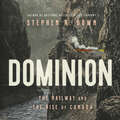
Dominion: The Railway and the Rise of Canada
By Stephen Bown. 2023
Stephen R. Bown continues to revitalize Canadian history with this thrilling account of the engineering triumph that created a nation.In…
The Company, his bestselling work of revisionist history, Stephen Bown told the dramatic, adventurous and bloody tale of Canada's origins in the fur trade. With Dominion he continues the nation's creation story with an equally gripping and eye-opening account of the building of the Canadian Pacific Railway.In the late 19th century, demand for fur was in sharp decline. This could have spelled economic disaster for the venerable Hudson's Bay Company. But an idea emerged in political and business circles in Ottawa and Montreal to connect the disparate British colonies into a single entity that would stretch from the Atlantic to the Pacific. With over 3,000 kilometers of track, much of it driven through wildly inhospitable terrain, the CPR would be the longest railway in the world and the most difficult to build. Its construction was the defining event of its era and a catalyst for powerful global forces.The times were marked by greed, hubris, blatant empire building, oppression, corruption and theft. They were good for some, hard for most, disastrous for others. The CPR enabled a new country, but it came at a terrible price.In recent years Canadian history has been given a rude awakening from the comforts of its myths. In Dominion, Stephen Bown again widens our view of the past to include the adventures and hardships of explorers and surveyors, the resistance of Indigenous peoples, and the terrific and horrific work of many thousands of labourers. His vivid portrayal of the powerful forces that were molding the world in the late 19th century provides a revelatory new picture of modern Canada's creation as an independent state.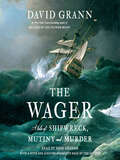
The wager: A tale of shipwreck, mutiny and murder
By David Grann. 2023
From the #1 New York Times bestselling author of Killers of the Flower Moon , a page-turning story of shipwreck,…
survival, and savagery, culminating in a court martial that reveals a shocking truth. The powerful narrative reveals the deeper meaning of the events on The Wager , showing that it was not only the captain and crew who ended up on trial, but the very idea of empire. "A tour de force of narrative nonfiction." — The Wall Street Journal On January 28, 1742, a ramshackle vessel of patched-together wood and cloth washed up on the coast of Brazil. Inside were thirty emaciated men, barely alive, and they had an extraordinary tale to tell. They were survivors of His Majesty’s Ship the Wager, a British vessel that had left England in 1740 on a secret mission during an imperial war with Spain. While the Wager had been chasing a Spanish treasure-filled galleon known as "the prize of all the oceans," it had wrecked on a desolate island off the coast of Patagonia. The men, after being marooned for months and facing starvation, built the flimsy craft and sailed for more than a hundred days, traversing nearly 3,000 miles of storm-wracked seas. They were greeted as heroes. But then ... six months later, another, even more decrepit craft landed on the coast of Chile. This boat contained just three castaways, and they told a very different story. The thirty sailors who landed in Brazil were not heroes – they were mutineers. The first group responded with countercharges of their own, of a tyrannical and murderous senior officer and his henchmen. It became clear that while stranded on the island the crew had fallen into anarchy, with warring factions fighting for dominion over the barren wilderness. As accusations of treachery and murder flew, the Admiralty convened a court martial to determine who was telling the truth. The stakes were life-and-death—for whomever the court found guilty could hang. The Wager is a grand tale of human behavior at the extremes told by one of our greatest nonfiction writers. Grann’s recreation of the hidden world on a British warship rivals the work of Patrick O’Brian, his portrayal of the castaways’ desperate straits stands up to the classics of survival writing such as The Endurance , and his account of the court martial has the savvy of a Scott Turow thriller. As always with Grann’s work, the incredible twists of the narrative hold the reader spellbound
My Effin' Life
By Geddy Lee. 2023
The long-awaited memoir, generously illustrated with never-before-seen photos, from the iconic Rock and Roll Hall of Famer, Rush bassist, and…
New York Times bestselling author of Geddy Lee's Big Beautiful Book of Bass.Geddy Lee is one of rock and roll's most respected bassists. For nearly five decades, his playing and work as co-writer, vocalist and keyboardist has been an essential part of the success story of Canadian progressive rock trio Rush. Here for the first time is his account of life inside and outside the band.Long before Rush accumulated more consecutive gold and platinum records than any rock band after the Beatles and the Rolling Stones, before the seven Grammy nominations or the countless electrifying live performances across the globe, Geddy Lee was Gershon Eliezer Weinrib, after his grandfather was murdered in the Holocaust.As he recounts the transformation, Lee looks back on his family, in particular his loving parents and their horrific experiences as teenagers during World War II.He talks candidly about his childhood and the pursuit of music that led him to drop out of high school.He tracks the history of Rush which, after early struggles, exploded into one of the most beloved bands of all time.He shares intimate stories of his lifelong friendships with bandmates Alex Lifeson and Neil Peart—deeply mourning Peart’s recent passing—and reveals his obsessions in music and beyond.This rich brew of honesty, humor, and loss makes for a uniquely poignant memoir.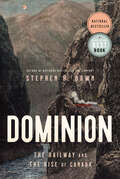
Dominion: The Railway and the Rise of Canada
By Stephen Bown. 2023
A thrilling new account of the engineering triumph that created a nationIn The Company, his bestselling work of revisionist history,…
Stephen R. Bown told the dramatic, adventurous and bloody tale of Canada's origins in the fur trade. With Dominion he continues the nation's creation story with an equally gripping and eye-opening account of the building of the Canadian Pacific Railway.In the late 19th century, demand for fur was in sharp decline. This could have spelled economic disaster for the venerable Hudson's Bay Company. But an idea emerged in political and business circles in Ottawa and Montreal to connect the disparate British colonies into a single entity that would stretch from the Atlantic to the Pacific. With over 3,000 kilometres of track, much of it driven through wildly inhospitable terrain, the CPR would be the longest railway in the world and the most difficult to build. Its construction was the defining event of its era and a catalyst for powerful global forces.The times were marked by greed, hubris, blatant empire building, oppression, corruption and theft. They were good for some, hard for most, disastrous for others. The CPR enabled a new country, but it came at a terrible price.Stephen R. Bown again widens our view of the past to include the adventures and hardships of explorers and surveyors, the resistance of Indigenous peoples, and the terrific and horrific work of many thousands of labourers. His vivid portrayal of the powerful forces that were moulding the world in the late 19th century provides a revelatory new picture of modern Canada's creation as an independent state.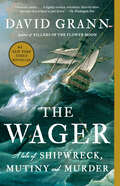
The Wager: A Tale of Shipwreck, Mutiny and Murder
By David Grann. 2023
#1 NEW YORK TIMES BESTSELLER • From the author of Killers of the Flower Moon, a page-turning story of shipwreck,…
survival, and savagery, culminating in a court martial that reveals a shocking truth. The powerful narrative reveals the deeper meaning of the events on The Wager, showing that it was not only the captain and crew who ended up on trial, but the very idea of empire.A Best Book of the Year: The New York Times, The Wall Street Journal, The New Yorker, TIME, Smithsonian, NPR, Vulture, Kirkus Reviews&“Riveting...Reads like a thriller, tackling a multilayered history—and imperialism—with gusto.&” —Time "A tour de force of narrative nonfiction.&” —The Wall Street JournalOn January 28, 1742, a ramshackle vessel of patched-together wood and cloth washed up on the coast of Brazil. Inside were thirty emaciated men, barely alive, and they had an extraordinary tale to tell. They were survivors of His Majesty&’s Ship the Wager, a British vessel that had left England in 1740 on a secret mission during an imperial war with Spain. While the Wager had been chasing a Spanish treasure-filled galleon known as &“the prize of all the oceans,&” it had wrecked on a desolate island off the coast of Patagonia. The men, after being marooned for months and facing starvation, built the flimsy craft and sailed for more than a hundred days, traversing nearly 3,000 miles of storm-wracked seas. They were greeted as heroes.But then ... six months later, another, even more decrepit craft landed on the coast of Chile. This boat contained just three castaways, and they told a very different story. The thirty sailors who landed in Brazil were not heroes – they were mutineers. The first group responded with countercharges of their own, of a tyrannical and murderous senior officer and his henchmen. It became clear that while stranded on the island the crew had fallen into anarchy, with warring factions fighting for dominion over the barren wilderness. As accusations of treachery and murder flew, the Admiralty convened a court martial to determine who was telling the truth. The stakes were life-and-death—for whomever the court found guilty could hang.The Wager is a grand tale of human behavior at the extremes told by one of our greatest nonfiction writers. Grann&’s recreation of the hidden world on a British warship rivals the work of Patrick O&’Brian, his portrayal of the castaways&’ desperate straits stands up to the classics of survival writing such as The Endurance, and his account of the court martial has the savvy of a Scott Turow thriller. As always with Grann&’s work, the incredible twists of the narrative hold the reader spellbound.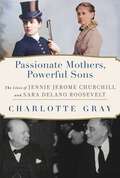
A captivating dual biography of two famous women whose sons would change the course of the 20th century—by award-winning historian…
Charlotte Gray.Born into upper-class America in the same year, 1854, Sara Delano (later to become the mother of Franklin Delano Roosevelt) and Jennie Jerome (later to become the mother of Winston Churchill) refused to settle into predictable, sheltered lives as little-known wives to prominent men. Instead, both women concentrated their energies on enabling their sons to reach the epicentre of political power on two continents. In the mid-19th century, the British Empire was at its height, France&’s Second Empire flourished, and the industrial vigor of the United States of America was catapulting the republic towards the Gilded Age. Sara and Jennie, raised with privilege but subject to the constraints of women&’s roles at the time, learned how to take control of their destinies—Sara in the prosperous Hudson Valley, and Jennie in the glittering world of Imperial London. Yet their personalities and choices were dramatically different. A vivacious extrovert, Jennie married Lord Randolph Churchill, a rising politician and scion of a noble British family. Her deft social and political maneuverings helped not only her mercurial husband but, once she was widowed, her ambitious son, Winston. By contrast, deeply conventional Sara Delano married a man as old as her father. But once widowed, she made Franklin, her only child, the focus of her existence. Thanks in large part to her financial support and to her guidance, Franklin acquired the skills he needed to become a successful politician. Set against one hundred years of history, Passionate Mothers, Powerful Sons is a study in loyalty and resilience. Gray argues that Jennie and Sara are too often presented as lesser figures in the backdrop of history rather than as two remarkable individuals who were key in shaping the characters of the sons who adored them and in preparing them for leadership on the world stage. Impeccably researched and filled with intriguing social insights, Passionate Mothers, Powerful Sons breathes new life into Sara and Jennie, offering a fascinating and fulsome portrait of how leaders are not just born but made.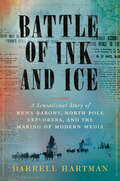
"Absolutely gripping… a perfectly splendid read—I highly, highly recommend it&” -- Douglas Preston, author of the #1 New York Times…
bestseller The Lost City of the Monkey GodA sixty-year saga of frostbite and fake news that follows the no-holds-barred battle between two legendary explorers to reach the North Pole, and the newspapers which stopped at nothing to get–and sell–the story.In the fall of 1909, a pair of bitter contests captured the world&’s attention. The American explorers Robert Peary and Frederick Cook both claimed to have discovered the North Pole, sparking a vicious feud that was unprecedented in international scientific and geographic circles. At the same time, the rivalry between two powerful New York City newspapers—the storied Herald and the ascendant Times—fanned the flames of the so-called polar controversy, as each paper financially and reputationally committed itself to an opposing explorer and fought desperately to defend him.The Herald was owned and edited by James Gordon Bennett, Jr., an eccentric playboy whose nose for news was matched only by his appetite for debauchery and champagne. The Times was published by Adolph Ochs, son of Jewish immigrants, who&’d improbably rescued the paper from extinction and turned it into an emerging powerhouse. The battle between Cook and Peary would have enormous consequences for both newspapers, and help to determine the future of corporate media. BATTLE OF INK AND ICE presents a frank portrayal of Arctic explorers, brave men who both inspired and deceived the public. It also sketches a vivid portrait of the newspapers that funded, promoted, narrated, and often distorted their exploits. It recounts a sixty-year saga of frostbite and fake news, one that culminates with an unjustly overlooked chapter in the origin story of the modern New York Times.By turns tragic and absurd, BATTLE OF INK AND ICE brims with contemporary relevance, touching as it does on themes of class, celebrity, the ever-quickening news cycle, and the benefits and pitfalls of an increasingly interconnected world. Above all, perhaps, its cast of characters testifies—colorfully and compellingly—to the ongoing role of personality and publicity in American cultural life as the Gilded Age gave way to the twentieth century—the American century.